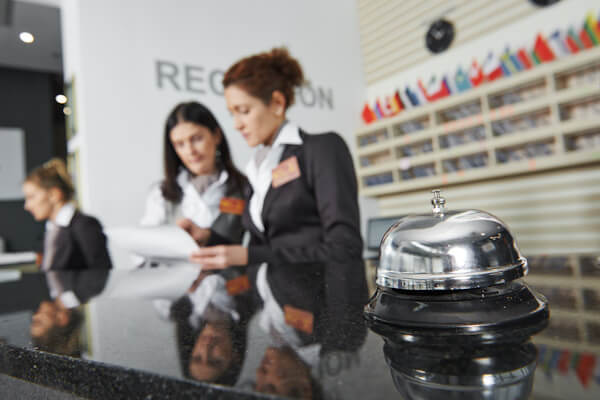Setting Social Media Goals for Hotels
Setting goals is an important part of developing and executing a successful social media action plan. The Content Marketing Institute reported that the most common and often most effective social media objectives are to:
- Engage new customers/prospects
- Raise brand awareness
- Increase traffic to your site
- Increase sales
- Improve brand perception
If we apply this list to hospitality, we can identify a few potential social media goals for hotels:
- Improve guest communications
- Engage with past, current, and prospective guests
- Generate more website traffic
- Increase your brand’s exposure
- Enable direct bookings
After you determine what the high-level goals are for your hotel, you can decide where to focus your efforts on social media. Here are potential social media networks and actions associated with each goal.
Social Media Goals for Hotels
Goal: Improve guest communications
Networks: Facebook and Twitter
If your goal is to improve your guest communications, focus on Facebook and Twitter. Twitter, in particular, is conducive to cultivating a two-way customer service dialogue between your hotel and your guests. Guests already use these channels when they want to ask questions or make a complaint public. In fact, according to a 2012 L2 report, 77% of hotel Twitter accounts and 44% of hotel Facebook accounts receive customer service-related messages. To improve guest communications, you should talk to your guests via their preferred channels.
Goal: Engage with past, current, and prospective guests
Networks: Facebook, Twitter, Instagram
Guests don’t use social media only for complaints or questions. Consumers are increasingly following brands they like on Facebook, Twitter, and Instagram, especially those that somehow provide value with their social media posts. All three of these social networks allow for cultivating a one-to-one relationship between hotels and guests.
How can hoteliers cultivate this relationship? You can start by responding when your fans make comments on your page. If a past guest comments that he or she enjoyed staying at your hotel, reply to the relevant Twitter or Instagram handle. You can say something like, “We’re so delighted you enjoyed your stay with us! We’d love to have you again sometime.”
Try user-generated content campaigns. For example, re-tweet your guests’ tweets about their fantastic stays, and consider reaching out to them privately. These socially active guests are potential influencers, who will continue to promote your hotel to their network, if you treat them well and gain their loyalty. You can also run Instagram campaigns with guest photos, tagging your property in the location. Be careful to give credit where due by incorporating the guest’s Instagram handle in the description. You may also want to consider asking for the guest’s permission before you use the photo. Here’s one way to get permission:
Remember, your social media followers are often your best customers. Take advantage of Instagram, Twitter, and Facebook to cultivate the relationship and turn your fans into promoters.
Goal: Generate more website traffic
Networks: Google+ and YouTube
If generating more website traffic to your site through social media is the paramount priority, optimizing your Google+ presence should be number one on your to-do list. Your Google+ presence will have the biggest long-term impact on improving your search engine optimization through social media. YouTube videos also rank high in organic search results, boosting your SEO.
Goal: Increase your brand’s exposure and enable direct bookings
Networks: All of them
Encouraging guests to book with you directly rather than through an OTA can be as simple as first increasing brand exposure, and then cultivating one-to-one relationships with your fans. Facebook, Twitter, YouTube, Instagram, Pinterest, and Google+ can impact your hotel’s exposure in a way that is uniquely social and complementary to your company’s website. Just as consistently compelling, Facebook posts can help get your brand’s message into users’ News Feeds, while proactive social listening on Twitter affords an excellent opportunity to crowdsource unique user-generated content about your hotel or restaurant.
Once that communication channel is open between you and your customers, you can use it to target them with messaging, inspire them with photos, and share special offers. These activities will drive direct bookings to you. Also, guests who feel an affinity with your brand will be more likely to book with you over a competitor that doesn’t spend time building a relationship with its followers.
While it’s important to note that each of these social media channels is very different in terms of the types of campaigns you can run and the types of followers you can reach, they all have one thing in common: Your guests engage with brands on these channels because they feel the brand provides value. Facebook’s recent decision to change its News Feed algorithm so that posts that feel too promotional don’t show up in users’ News Feeds is reflective of this. Today’s hotel guests don’t want to be sold to. They want to build relationships and have conversations.
Want to drive more direct revenue and connect with guests? Download our free Email Marketing Strategy Guide. Never before has there been a more jam-packed, industry-specific guide to help hoteliers master the art (and science) of email marketing. Over 40+ topics with actionable insights, strategies, and best practices for email marketing.
Related Posts

Insights that drive results
Subscribe now to get the latest content
This site is protected by reCAPTCHA and the Google Privacy Policy and Terms of Service apply. *Required fields.




